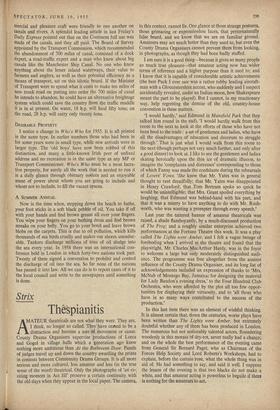Strix
Thespianitis
AMATEUR theatricals are not what they were. They are, I think, no longer so called. They have ceased to be a distraction and become a sort of movement or cause. County Drama Organisers supervise productions of Lorca and Gogol in village halls which a generation ago knew nothing more ambitious than At the Bathroom Door. Panels of judges travel up and down the country awarding the prizes in contests between Community Drama Groups. It is all more serious and more cultured, less amateur and less (in the true sense of the word) theatrical. Only the photographs of 'an ex- citing moment in Act III' preserve a certain continuity with the old days when they appear in the local paper. The camera, in this context, cannot lie. One glance at those strange postures, those grimacing or expressionless faces, that preternaturally false beard, and we know that we are on familiar ground. Amateurs may act much better than they used to, but even the County Drama Organisers cannot prevent them from looking, in photographs, as though they had been badly stuffed.
I am sure it is a good thing—because it gives so many people so much true pleasure—that amateur acting now has wider terms of reference and a higher purpose than it used to; and I know that it is capable of considerable artistic achievements (the best Puck I ever saw was a rather tubby leading aircraft- man with a Gloucestershire accent, who suddenly and I suspect accidentally revealed, under an Indian moon, how Shakespeare meant the part to be played). But I cannot, in my reactionary way, help regretting the demise of the old, country-house convention in these matters.
'I would hardly,' said Edmund in Mansfield Park (but they talked him round in the end), 'I would hardly walk from this room to the next to look at the efforts of those who have not been bred to the trade : a set of gentlemen and ladies, who have all the disadvantages of education and decorum to struggle thi.ough.' That is just what I would walk from this room to the next (though perhaps not very much further, and only after a good dinner) to look at. I like to see the gentlemen and ladies skating heroically upon the thin ice of dramatic illusion, to imagine the 'complaints and distresses' corresponding to those of which Fanny was made the confidante during the rehearsals of Lovers' Vows. 'She knew that Mr. Yates was in general thought to rant dreadfully; that Mr. Yates was disappointed in Henry Crawford; that Tom Bertram spoke so quick he would be unintelligible; that Mrs. Grant spoiled everything by laughing; that Edmund was behind-hand with his part, and that it was a misery to have anything to do with Mr. Rush- worth, who was wanting a prompter through every speech.'
Last year the tattered banner of amateur theatricals was raised, a shade flamboyantly, by a much-discussed production of The Frog; and a roughly similar enterprise achieved two performances at the Fortune Theatre this week. It was a play called The Lights were Amber, and I felt a vague twinge of foreboding when I arrived at the theatre and found that the playwright, Mr. Charles MacArthur Hardy, was in the foyer to welcome a large but only moderately distinguished audi- ence. The programme was free altogether from the austere influence of the County Drama Organiser, and its long list of acknowledgements included an expression of thanks to 'Mrs. McNab of Montego Bay, Jamaica; for designing the material for Lady Bandon's evening dress,' to the Four Hundred Club Orchestra, who were afforded by the plot all too few oppor- tunities for displaying their virtuosity, and to 'all those who have in so many ways contributed to the success of the production.'
In this last item there was an element of wishful thinking. It is almost certain that, down the centuries, worse plays have been written than The Lights were Amber, but extremely doubtful whether any of them has been produced in London. The numerous but not noticeably talented actors, floundering woodenly in this morass of dry-rot, never really had a chance; and on the whole the best performance of the evening came from General Sir Bernard Paget, who as Chairman of the Forces Help. Society and Lord Roberts's Workshops, had to explain, before the curtain rose, what the whole thing was in aid of. He had something to say, and said it well. I suppose the lesson of the evening is that two blacks do not make a white, and that amateur acting is powerless to beguile if there is nothing for the amateurs to act.










































 Previous page
Previous page